Altered States (1980)
“There’s a physiological pathway to our earlier consciousnesses. There has to be.”
|
Synopsis: |
|
Genres, Themes, Actors, and Directors:
Response to Peary’s Review: Peary does point out, however, that “there is much that is noteworthy” in the film — including its “blasting soundtrack” (which “won the picture an Oscar”), special effects by Bran Ferren (which Peary argues are “often ill-chosen but dynamic”, though I found them appropriately surreal throughout), and the “remarkable make-up work” of “the legendary Dick Smith” (who worked on, among many other titles, The Exorcist and Scanners — click here for his website). Peary notes that Russell “keeps things under surprising control for a change”, and does wonders with Chayefsky’s “overwritten script”; in his more detailed analysis of the film for his Cult Movies 2 book, Peary explains that Russell “solved much of [Chayefsky’s] overwritten dialogue problem by having his actors talk so quickly that lines that would make no sense to the average viewer anyway are lost” — a technique which works remarkably well, and actually helps to impress upon us the essential fact that “the characters are loquacious about erudite subjects”. As Peary notes, the fine ensemble cast “are all believable, and smooth, as they deliver intellectual diatribes” (with Blair particularly noteworthy in what could have been a somewhat thankless role). Despite its flaws, then, film fanatics will surely want to check out this audacious, visually evocative, finely acted headtrip at least once. Redeeming Qualities and Moments:
Must See? Categories
Links: |
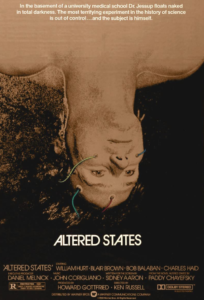
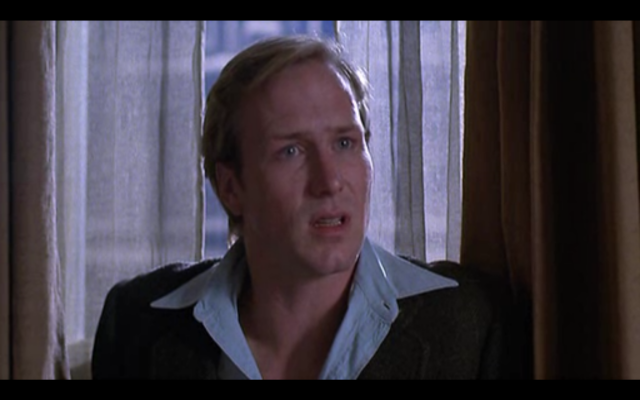
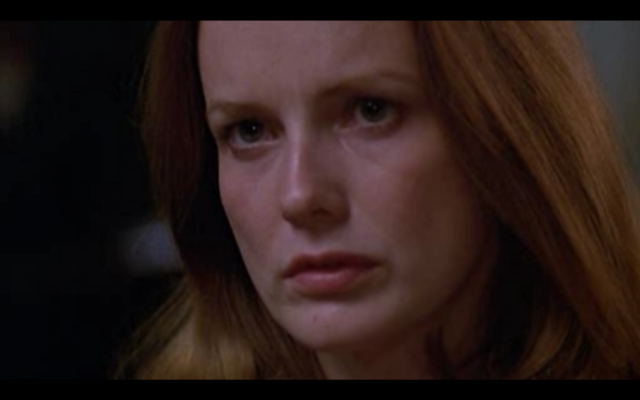
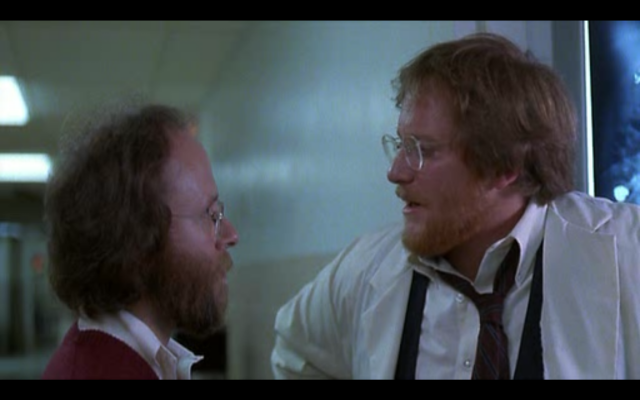

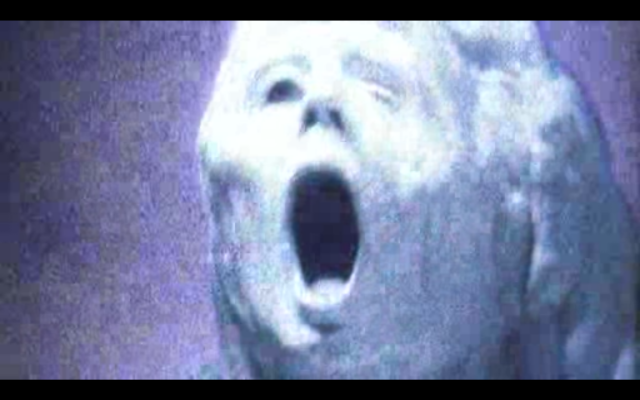
2 thoughts on “Altered States (1980)”
A must – not because it’s such a great movie (I’m not a big fan), but it has earned its place as a cult favorite and, as such, ffs will want to experience it.
I saw this when it was released, then probably just once when it became available on VHS. Haven’t had much of an urge to return to it since. Watching it again, I found myself side-tracked by certain elements (brought out in the overview) which can become bothersome during a repeat viewing: mainly Hurt’s non-stop “mumbo jumbo” (which gets to be a bit much, even though he manages his speeches with a fair amount of aplomb).
In a sense, the crux of this ‘mad scientist’ tale is so patently absurd (man’s quest for ‘truth’ notwithstanding) that Russell’s madcap, endlessly inventive flourishes make a kind of ‘sense’. …Until they don’t: say, about the last 20 minutes or so. At that point, you really have to throw up your hands and enjoy the ride.
It’s a hell of a ride, and does hold up well to repeated viewings. It’s not a great Paddy Chayefsky screenplay, and not a great novel. But it is an intriguing idea, which is better than having a great script with a dull idea, particularly here. And not unlike other Chayefsky scripts, The Hospital and Network come to mind, it immerses you in the characters’ frenetic world from the start. The dialogue itself serves more as atmospherics, and is mitigated brilliantly by Ken Russell: much of the dialogue is word for word faithful to the book where reading it on the page falls flat.
The cast is quite an ensemble with easy chemistry. I really enjoyed the energy of the ramblings and full throated arguments with Bob Balaban and Charles Haid. Their fights are gloriously over-the-top and practically steal the show.
I’m glad you brought up Cult Films 2, because Peary’s expanded review there is well-researched as always. But I didn’t feel that Chayefsky’s ending was dodging controversy as a crowd-pleasing tactic as Peary suggests. Peary then proposes alternate banal endings and admits they’re “also trite,” “would not have improved the film at all, but they just might have sparked the controversy necessary to have made the film a hit.” The “just might” word choice at least tries to hedge what is a supposition that doesn’t hold water. The movie’s choice of topic alone was risky, without a readymade audience with probably modest success being the best outcome. How the movie ended or would have ended is not a great predictor of commercial success. Most people, whether it’s now, or 1980 or 1968 don’t typically go to the movies to see deep scientific discussions with state of the art special effects and shocking endings.
As for Peary’s read on Jessup’s conclusion at the end, I didn’t interpret it the same way… at all. Jessup had reached the end of his quest like Oppenheimer after the Manhattan Project. Or Solomon’s reflections throughout Ecclesiastes. And all of this for what, he now asks. Been there, done that, seen that, in my maniacal crusade I’ve probably done permanent damage to myself, become something that could regress and hurt myself, my family. (I actually care about my family it turns out.) All for what? It takes Jessup’s character the entire movie to realize that while his quest is a scientific breakthrough, it’s an empty accomplishment. It’s fair game for him to ask if it IS really worth it. And what exactly will this do for humanity? Is Jessup’s take really a letdown or even relevant for the audience having seen what happened already?
It’s interesting that Peary chooses in CF2 to mention Kubrick’s 2001 as an ideal of how a film of this kind shouldn’t be too obvious and answer too much. One problem with that comparison is that 2001 begins and ends as a thorough abstraction. Further, it is never concerned with interpersonal relationships AT ALL. The characters aren’t central to the story. In fact, there is an unusual level of detachment for them in 2001. The search for the monolith itself and the murderous AI technology to facilitate that is the closest you get to a narrative. There is no point where we much care about the actors in 2001 in their intentional anonymity. However, we do care about what happens to the characters in AS: this is still a movie about people. The journey is a central element, but so are the characters who are dynamic and vulnerable and susceptible to change. It’s through the story that Chayefsky is trying to make some sense of all of his mountains of research and bring humanity into it, even if his results are flawed.
On a side note I thoroughly disagree with Peary when he surmises in CF2 “how popular would 2001 have been if everyone understood the meanings of the black monolith and the star child[?]” That’s completely unknowable. You actually could make the case that 2001 should have been a much bigger hit, for as much as it cost and as long as it took to make, had it been less focused on contrived obscurity. I think it’s a challenging, awesome masterpiece without question, but it too is imperfect.
To suggest that AS could have been more successful if it was only more vague in its conclusions to me is not plausible. By 1980, trippy movies were no longer popular, and eye popping special effects were not a guarantee of success. But it’s also important to remember that 2001 was a rare exception in that it succeeded despite being over people’s heads. And it arrived at a time when audiences were becoming more receptive to challenging science fiction topics while AS arrived late to the party.